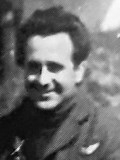Many of my friends ended up worse off, so I was actually lucky

Stáhnout obrázek
Imrich Lom, née Leichter, was born May 4, 1918 in Dolní Kubín in Slovakia but spent his childhood and youth in Ostrava. After the break-up of Czechoslovakia and establishment of the Protectorate he managed to escape to Poland (still free at that time) on the second attempt. Poland was then invaded by the German and Soviet army and he ended up in Soviet captivity and spent a year and a half in detention. The situation changed when Germany attacked the Soviet Union and the interned Czechoslovak soldiers were sent to fight in the Middle East. He took part in the fighting at Tobruk. Later he joined the air force and became member of the Czechoslovak No. 311 Squadron of the Royal Air Force. He fought the Nazis alongside the greatest men of that time, only to be left – just like the others – with no gratification after the war. He didn’t get to reunite with anyone from his family as all his relatives had died in the concentration camps. After the communists seized power he was discharged from the military, supported himself as a laborer and worked on the Slapy reservoir construction. He died in December 2003.
